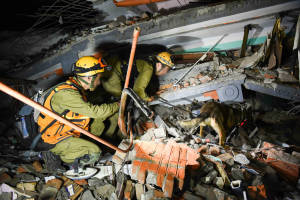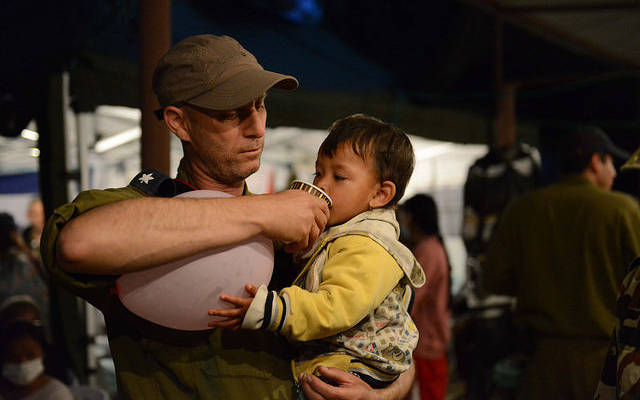
Israeli soldiers during rescue attempts of injured and trapped people from the ruins of buildings in Nepal. (IDF Spokesperson)
Marking World Humanitarian Day on Wednesday, Israel is celebrating decades of humanitarian operations around the globe that have benefited thousands of people.
Israel joined the international community in marking World Humanitarian Day, which falls this year on Wednesday.
August 19 was designated by the UN General Assembly as World Humanitarian Day to coincide with the anniversary of the 2003 Islamic suicide bombing of UN headquarters in Baghdad, Iraq, when 22 humanitarian workers lost their lives.
This year’s theme is “Inspiring the World’s Humanity.” As UN Secretary-General Ban Ki-moon explained, “each of us has the power and responsibility to inspire our fellow human beings to act to help others and create a more humane world.”
“This approach is and has been an integral part of the vision of the State of Israel of offering a helping hand to all human beings and nations in need. It is also a manifestation of the very deep Jewish traditional ideological ideal of Tikun Olam – healing the world – without prejudice of race or religion,” Israel’s Foreign Ministry stated on the occasion.
“Regardless of Israel’s own internal and regional challenges, at a time of any humanitarian crisis in any corner of our globe, you will most probably find Israeli humanitarian relief teams amongst the first on site,” the foreign ministry said in a statement.
Israel has a proud history of leading humanitarian, medical and logistical assistance to countries in distress around the world, including, for example, tornado victims in Oklahoma, typhoon refugees of storms in the Philippines and earthquake victims in Haiti and Nepal. The Jewish state was most recently active in sending relief to flood victims in Myanmar.
David Ben-Gurion, Israel’s first prime minister, expressed the country’s marching slogan when he said: “The principles of mutual assistance and equality should also constitute the basis for international relations between people…[and] must be based on the solidarity of all human beings, derived from fraternity and mutual assistance in every sphere of life.”
Israeli Humanitarian Operations in 140 Countries
One of the leading forces in Israel global humanitarian effort is MASHAV, Israel’s Agency for International Development Cooperation at the Ministry of Foreign Affairs, the body responsible for coordinating the State of Israel’s official humanitarian assistance program. Drawing on Israel’s vast experience in crisis response and field medicine, the agency rapidly organizes and dispatches much needed supplies, medicines and urgent professional assistance.
Along the years, Israel has sent humanitarian relief and assistance to more than 140 countries, saving a great number of lives – from newborns to the elderly.
Looking back at the last 12 months alone could suitably indicate the scope of Israel’s activities.
Last October, the State of Israel, through MASHAV, joined the international community in responding to the outbreak of the Ebola virus in western African countries by launching “Operation Hospitals of Hope”, which included dispatching and setting up three fully equipped emergency mobile-clinics in Liberia, Sierra Leone and Guinea Conakry, among other relief and capacity-building activities. Alongside Israel’s financial contributions, the State of Israel became the largest donor per capita to the Ebola response efforts.
Following the devastating earthquake that struck Nepal in April, Israel provided immediate response by dispatching a 260-member IDF disaster team, including Israel’s top trauma specialists, and setting up a field hospital near Kathmandu equipped with x-rays, laboratories and operating rooms, providing care for around 200 patients a day.
In recent months, MASHAV offered emergency aid to victims of severe floods in Serbia and Bosnia and to Chile and Paraguay following heavy rains and mudslides; delivered over 100,000 life-saving concentrated food rations to Madagascar to fight malnutrition for over 10,000 children in the drought-stricken southern region; donated two skin graft meshers to Taiwan to treat more than 400 victims who remained hospitalized following the severe water park explosion in June; and assisted victims of the devastating torrential monsoon rains that triggered deadly floods and landslides affecting almost every state in Myanmar.
Helping to Rebuild Lives
Responding to emergencies is only one aspect of humanitarian work. Israel supports communities’ efforts to rebuild their lives after disasters and to become more resilient to future crises.
In 1958, the State of Israel adopted its official humanitarian aid agenda as a principal element of the country’s international cooperation efforts.
”As the head of MASHAV, I’m proud to say that the Israel is still at the forefront of providing immediate response in the wake of humanitarian crises, strengthening its commitment as a member of the family of nations. We have done so in the past, we are doing it today, and we will do it whenever and wherever our assistance is needed,” said director Gil Haskel.
By: United with Israel Staff
